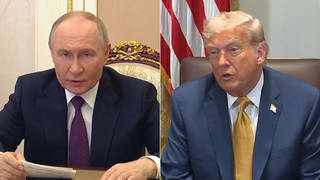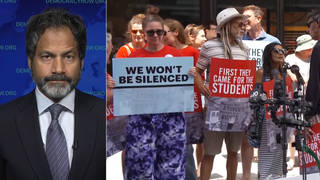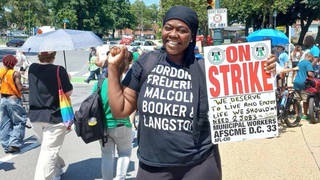
The fight to retake the last stronghold of the self-proclaimed Islamic State in Iraq has entered its third day with a U.S.-led coalition force of about 30,000 that includes Iraqi security personnel, Kurdish fighters, Sunni Muslim Arab tribesmen and Shia Muslim paramilitaries. The Pentagon says U.S. special forces are on the ground in Iraq and taking part in the battle, despite President Obama’s pledge against having boots on the ground. They face an estimated 5,000 Islamic State fighters in and around Mosul. Meanwhile, humanitarian workers say some 200,000 people may need shelter during the offensive. We speak with Patrick Cockburn, Middle East correspondent for The Independent, where he writes that Mosul is bracing for its next bloody chapter after being ravaged by 13 years of war.
Transcript
AMY GOODMAN: We begin today’s show in Iraq, where fighting to retake the last stronghold of the Islamic State in the country has entered its third day. The U.S.-led coalition force of about 30,000 includes Iraqi security personnel, Kurdish fighters, Sunni Muslim Arab tribesmen and Shia Muslim paramilitaries. The Pentagon has confirmed U.S. special forces are on the ground in Iraq and taking part in the battle, despite President Obama’s pledge against having boots on the ground. They face an estimated 5,000 ISIL fighters in and around Mosul.
Commanders say the operation is going as planned, though the ISIL fighters slowed advancing troops with suicide car bomb attacks. A Peshmerga military commander told CNN it could take two months for the troops to recapture Mosul, which ISIL has controlled for two years. President Obama says Iraq’s fight to take Mosul will be successful, but difficult.
PRESIDENT BARACK OBAMA: We are seeing the Iraqi forces, with the support of the coalition that includes the United States and Italy and other nations, moving forward and encircling Mosul. The intention is to drive ISIL out of what was its first major urban stronghold and what continues to be one of the key organizational and logistical and leadership hubs for ISIL. I am confident that we can succeed, although it’s going to be a tough fight and a difficult fight.
AMY GOODMAN: President Obama said, quote, “plans and infrastructure” are in place for dealing with a potential humanitarian crisis in Mosul, which has a population of about 2 million people. The United Nations humanitarian coordinator for Iraq said as 200,000 people might need shelter during the offensive. Humanitarian workers say the first large group of nearly a thousand civilians has now fled the city and crossed the border into Syria. Some expressed concern ISIL fighters would use the civilians as human shields as Iraqi forces get closer to Mosul. This is Courtney Lare with the Norwegian Refugee Council in the Iraqi city of Erbil.
COURTNEY LARE: NRC is currently preparing for massive waves of displacement coming out of Mosul. We are expecting in the first several weeks up to 200,000 individuals and, total, around 700,000 people fleeing Mosul in the coming months. The humanitarian community is desperately trying to prepare, but this many people at once is extremely challenging.
AMY GOODMAN: Well, for more, we go to London to speak with Patrick Cockburn, Middle East correspondent for The Independent. His recent article is headlined “Mosul braces itself for next [bloody] chapter having been ravaged by 13 years of war.” His book, just published, is titled Age of Jihad: Islamic State and the Great War for the Middle East.
Patrick, welcome back to Democracy Now! Talk about what’s happening in Mosul today.
PATRICK COCKBURN: Well, this is a very decisive battle, because this was the great victory of Islamic State, when they took it by surprise in June 2014. But it’s a little different, I think, from what one’s been seeing on television. The forces attacking it are very fragmented. You mentioned the Iraqi army, the Shia paramilitaries, the Kurds. They all have different agendas. They have a extreme rivalry. And this is one of the things that’s been keeping the Islamic State in business in the past and is going to affect the course of the battle.
I think the other thing to bear in mind with this battle is that it really wouldn’t be happening without U.S. support. The key thing here is U.S.-led airstrikes by the coalition. We’ve had, you know, people describe victories by the Iraqi government forces taking Ramadi and Fallujah, Tikrit and other places. But really what happens is that the forces advance and then call in airstrikes. In Ramadi, 70, 80 percent of the city is demolished. Outside Fallujah, there’s another town that only has four buildings left. So it’s very much a U.S.-led operation.
And it hasn’t really got into the city yet. We’ll really see what’s going to happen when street fighting starts. On each side of Mosul, you have a sort of level plane to the east where the Kurds are advancing. There are villages there. They’re mostly Christian, Yazidi, Shabak, which is another minority. They’re empty. People have fled two years ago. The Kurds say they won’t actually enter the city. Then the Iraqi army is not very large. I mean, it’s much less than the 30,000 troops. When it gets engaged in street fighting, then we will see what happens. Will it call in the Shia paramilitaries? Will it escalate the bombing? Will there be mass destruction in Mosul, which is a really big city, used to have 2 million people in it, like we’ve seen in Ramadi and other places?
AMY GOODMAN: Patrick, you begin your piece by saying the Iraqi government and its allies may eventually capture Mosul from ISIS, but this could be just a new chapter in the war. Explain.
PATRICK COCKBURN: Well, you know, there were actually—Mosul has been captured or recaptured five times since 2003. I was with the Kurdish forces then, who captured it, just as the Iraqi army of Saddam Hussein was defending it. And almost immediately, there was a battle with the Arab residents. I mean, Mosul is about three-quarters Sunni Arab. The Kurds moved in. There was mass looting everywhere. My car had Kurdish number plates, and a crowd came out of a mosque and identified Kurds as enemies, as looters, and were threatening to lynch my driver. Fortunately, somebody dissuaded them from doing this. I went to the local hospital, and there was shooting all around it. The local Arabs were—Sunni Arabs were being called by the mosques to defend their streets. They were putting up barricades. So, this is a sort of deeply divided place.
Then, David—the U.S. 101st Division came in under General Petraeus. And so, it kept things calm for a little bit, mainly by reversing the de-Baathification decree. But by the end of this year, you may remember, there was a great big battle for Fallujah outside Baghdad, led by the U.S. Marines. People didn’t notice, while this was happening, the Iraqi armed opposition came in and recaptured Mosul, a much bigger city. They moved out after a week. Then, of course, we had 2011. The ISIS captured it. And now it’s being fought for again.
So, you know, this is sort of illustrative of the enormous divisions there. Mosul stands rally at a sort of juncture of sectarian and ethnic differences. You know, and I’m oversimplifying, because Turkey wants to be a player there. It has 3,000 troops nearby. So, there are many ways the situation could go, but, generally, it will be going towards more war, not peace, after Mosul has fallen, if it falls.
AMY GOODMAN: Can you talk about the relationship between the Kurds and Arabs in Mosul, as well as the U.S. troops?
PATRICK COCKBURN: Well, the actual inhabitants, most of the Kurds have fled. There are sort of Kurdish districts there in Mosul, or there used to be, but the Kurds mostly fled or were driven out. The same is true of the Christians. Then you have the Kurds on the ground, the Peshmerga forces, advancing, but very much under U.S. air cover. In 2014, everybody kind of knows that the Iraqi army fled when it was attacked by ISIS. But actually, the Kurdish Peshmerga, although they had a better reputation, fled even faster, about a month later, when they were attacked.
So, you know, each of these sides, they have some crack troops, but, otherwise, it’s very sort of dubious. I was there earlier in the year just in this area where they’re attacking, and the initial offensive was postponed because a lot of the Kurdish troops hadn’t been paid for months. So, you know, it’s much more ramshackle than it looks. When you see it on television, you see orderly sort of ranks of troops moving forward and officers looking as though they’re very much in control.
We’ll see what really is going to happen when they get close to the city. You know, there must be some chance that ISIS will withdraw from it, but I doubt it, because this was their big victory. If they’re going to fight anywhere, they’re probably better off fighting in Mosul, because it’s less likely that the U.S.-led air coalition will destroy the city like they did Ramadi. So the likelihood is that it will be a long battle.
AMY GOODMAN: I want to go to a series of clips. On Monday, [White House Press Secretary] Josh Earnest said it was uncertain how long the Mosul operation would last.
PRESS SECRETARY JOSH EARNEST: I’m not aware that any sort of specific time frame has been laid out for when that operation would be completed. Obviously, this represents the next important step in our campaigns—or, our campaign against ISIL in Iraq. The United States has mobilized a 67-member coalition to support the Iraqi government and Iraqi security forces as they seek to rid ISIL from their country.
AMY GOODMAN: And this is Russian Foreign Minister Sergey Lavrov speaking Tuesday about Mosul.
SERGEY LAVROV: [translated] Of course we are following this Mosul operation, because we all are interested in defeating the so-called Islamic State. The city is not completely encircled, as far as I know. I don’t know why, but I hope it’s because they simply couldn’t do it, rather than because they didn’t want to do it. At least this corridor, which still exists, poses a risk that Islamic State members will leave Iraq, Mosul, and head to Syria.
AMY GOODMAN: Iraqi Foreign Minister Ibrahim al-Jaafari said Tuesday he is relying on support from the international community in the fight against ISIS.
IBRAHIM AL-JAAFARI: [translated] Daesh will not stop at Iraq. It will extend its hands and arms into different parts of the world. So we must look at it from this perspective. Iraq is not only fighting to defend itself, but also to defend all countries of the world, especially as these foreign fighters that are fighting for Daesh, they come from more than 100 countries. So, very humbly, we say that we are defending ourselves and all countries of the civilized world, and we are defending democracy.
AMY GOODMAN: So, Patrick Cockburn, as you hear the Iraqi foreign minister and Sergey Lavrov of Russia and the U.S., talk about the international significance of this and also what this means for Syria.
PATRICK COCKBURN: Well, you know, what happens there, like everything that happens in Iraq, affects countries outside. But it’s—you know, it’s one of the tragedies of Iraq, and also Syria, that you have factions and different parties within the country, but they’re all plugged into outside allies, all of whom have their own rivalries and all of whom have their own agendas, so—and these don’t necessarily lead towards peace. I mean, Turkey is saying that it wants to preserve Sunni dominance in Mosul. Obviously, there, the Kurds, the Shia, the Iraqi government have their own agendas.
How does this impact on Syria? Well, to some extent, a defeat for ISIS in Iraq will be defeat for ISIS in Syria, because one of the reasons we have ISIS at all, why they took the city in 2014, was they were able to expand into Syria during the war there. They were able to take advantage of the Syrian civil war and their own experience and money and weapons and offices to move into the war zone and take over most of eastern Syria. So, that will be affected by what’s happening in Mosul.
AMY GOODMAN: And what about the humanitarian situation, a city of 2 million, what this means?
PATRICK COCKBURN: Yeah, nobody quite knows how many are left there, you know, but it’s probably over a million. The World Food Program have been saying they were trying to preposition food for a million people. The thing is, you know, all these sieges, both in Iraq and Syria, have a certain amount in common, that you have, whether it’s in the various districts in Damascus, whether it’s East Aleppo, whether it’s Ramadi or Fallujah or Mosul, that the government forces want to separate the fighters from the civilian population. They do that by bombarding these places. Those who are defending the places—in this case, ISIS—obviously don’t want to lose the civilian population, so they prevent them leaving. Then they’re described as human shields. It kind of depends who’s doing the describing. Of course, the—in East Aleppo, they aren’t described as human shields. But basically, whoever is on the defending side has the same interest to keep the civilian population there. Now, will they be able—
AMY GOODMAN: I mean, don’t they have to be very desperate, Patrick, to fleeing into Syria?
PATRICK COCKBURN: Well, that has been the way out. It may seem that way. But the people I’ve spoken to who have got out, it seemed to be easier to—before this happened, to sort of bribe your way out or pay Islamic State. It used to cost about $600 per person to get out. You know, if you’re a family of five, it’s quite a lot of money for them. And then you’d cross into the Kurdish-controlled area of northeast Syria. You’re not crossing into Islamic State-controlled territory. You’d move into Kurdish-controlled territory and then move to camps there and then move—maybe move onward from there. That seemed to be the easiest route, while if the—geographically, the most direct route, straight into Iraqi Kurdistan, seemed to be more dangerous. I talked to people, you know, who had come from Mosul. They had paid money to guides and so forth, but they’re walking through fields, that they thought there were mines there. They were frightened that the Peshmerga might mistake them for suicide bombers and would shoot them. So, it seemed to be the safer route to go west rather than east, though, of course, you’re quite right, geographically, it’s much longer.
AMY GOODMAN: And we’re talking to you, of course, in the midst of the U.S. election, just a few weeks away. Talk about this in terms of the positions of Hillary Clinton and Donald Trump on the Middle East.
PATRICK COCKBURN: Well, you know, does this have an effect on the election? You know, I wonder. There are lots of conspiracy theories in the Middle East and beyond, that it’s planned now in order to affect the election in the U.S. If Mosul were to fall, then this will be a plus for the Obama administration and, therefore, for Hillary Clinton. It seems to be a bit far-fetched because it was pretty predictable that it’s not going to fall immediately. So, you know, would it really do them much good?
Though, you know, then one has to look at the whole situation in Iraq and Syria and what will be, you know, the effect of the outcome of the presidential election on that. Hillary Clinton and a number of her sort of leading candidates for high positions have talked about no-fly zones in Syria, talked about making Assad and Islamic State equal targets and somehow raising a moderate force to fight both. I would have thought that idea should be dead on the carpet, too, because the Pentagon and others have been trying that for four or five years, and it has not only failed, you know, it’s failed—it’s almost become a joke. So I’d be a bit surprised. No-fly zone sounds sort of benign, but, you know, a no-fly zone that excludes the Russians? Are we going to shoot down Russian planes and start the third world war? You know, who is going to control things on the ground? The armed opposition is very much dominated by al-Nusra and ISIS. I don’t know how far they consider these practical policies. So, you know, it could change. It could change for the worse.
There’s a lot of expectation in the Middle East that post-Obama there will be a sort of tougher U.S. line on Assad, there will be more intervention and so forth. But I don’t know if that’s going to be fulfilled. If there is more intervention, then I think it’s going to go the same way as these other interventions that we’ve seen in Iraq, we’ve seen, to a degree, in Syria, we’ve seen in Libya, you know, that they do really badly. They make bad situations worse.
AMY GOODMAN: Patrick Cockburn, we’re going to leave it there, Middle East correspondent for The Independent. We’ll link to your article, “Mosul braces itself for next bloody chapter having been ravaged by 13 years of war.” Patrick Cockburn’s book, The Age of Jihad: Islamic State and the Great War for the Middle East.
This is Democracy Now! Donald Trump says the elections are rigged. We’ll speak with The Nation's Ari Berman. He says they're rigged, but in a very different way. Stay with us.













Media Options